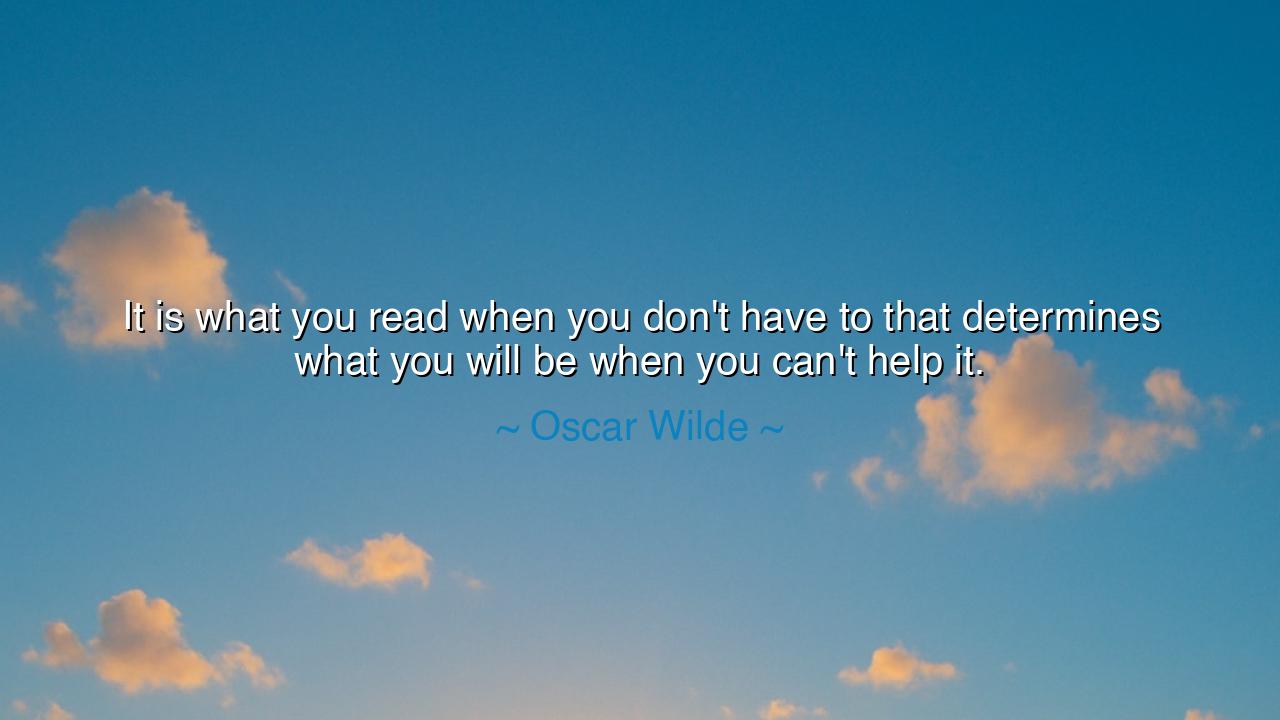
It is what you read when you don't have to that determines what
It is what you read when you don't have to that determines what you will be when you can't help it.






"It is what you read when you don’t have to that determines what you will be when you can’t help it." In this luminous reflection, Oscar Wilde, the master of wit and paradox, reveals a truth that transcends time. Behind his graceful phrasing lies a profound teaching: that the true measure of a soul is not found in what it is forced to learn, but in what it chooses to seek. Reading, to Wilde, was more than pastime—it was a mirror of the inner being, the quiet shaping of one’s destiny through voluntary curiosity. What a person consumes in moments of freedom becomes the foundation of their instincts, character, and fate, for what enters the mind by choice becomes the language of thought, and thought is the seed of life itself.
To understand the origin and essence of this quote, one must know the world from which Wilde spoke. He lived in the late nineteenth century, an age of both refinement and rebellion, when intellect was celebrated, yet conformity was expected. Wilde himself was a man who read voraciously—not only the classics of his education but the forbidden, the forgotten, and the new. He was a disciple of beauty, truth, and imagination. He knew that education, as society defined it, was a form of training, but true cultivation began only when a person sought knowledge out of love rather than duty. Thus, his words stand as both wisdom and warning: that what we feed the mind in our leisure—the poems, the philosophies, the stories we turn to when no one compels us—becomes the compass by which our souls are guided when reason is no longer conscious, when character acts without deliberation.
This teaching carries the ancient echo of the philosophers. Aristotle declared that virtue is a habit, formed by repetition until it becomes natural. So too does Wilde remind us that reading, the nourishment of the mind, leaves its imprint long after the act itself is forgotten. A man who reads idle gossip will think in trivialities; one who reads only to pass time will live a life that passes him by. But the one who reads with hunger for truth, who fills his free moments with great ideas, with noble words and deep thoughts—he is shaping the unseen architecture of his spirit. And when life presses upon him, when he must act without reflection, that inner architecture will hold him steady. For what he read when he did not have to will become what he is when he cannot help but be.
History gives us many living examples of this truth. Consider Abraham Lincoln, born into poverty, self-taught, with little formal education. He had no teacher but the books he chose to read when he “did not have to.” He read Aesop’s Fables, the Bible, Shakespeare, and The Pilgrim’s Progress. These works became the soil from which his wisdom grew. They taught him compassion, justice, and the rhythm of language that would one day make his speeches immortal. When the great trials of war and leadership came upon him, when instinct and conscience alone could guide him, it was those words, absorbed in solitude and humility, that shaped his judgment and humanity. Lincoln was the embodiment of Wilde’s truth: that a man’s soul is formed in the quiet hours of learning, not the public ones of display.
The same lesson may be seen in the ancient scholar Marcus Aurelius, the philosopher-emperor of Rome. In his youth, no one required him to read the writings of Epictetus, yet he did so out of his own yearning for wisdom. Those readings, chosen freely, molded his heart into one of the most serene and noble minds in history. When storms of betrayal and battle besieged his reign, he met them with equanimity, writing in his Meditations not words of bitterness but reflections of peace. The wisdom he drew in private became the fortress of his public life. Thus, in every age, it is what one reads when free that determines how one acts when fate removes freedom.
Wilde’s statement also carries a moral dimension. He reminds us that we are self-created beings. No power outside of us shapes our minds more profoundly than our own choices. The books we read in idleness, the words we feed our imagination, are the silent architects of who we become. When we turn to what is noble, beautiful, and wise, we build within ourselves a temple of thought. But when we indulge only in the shallow and the sensational, we erode our capacity for meaning. Wilde, ever the artist of life, knew that what we choose to admire defines what we become capable of creating. “You are what you read,” his quote implies—not in body, but in soul.
Let this then be the teaching drawn from his wisdom: read not for obligation, but for transformation. Seek out words that challenge and uplift, for they will become the unseen companions of your mind. Read the great thinkers, poets, and prophets—not because you must, but because they awaken the grandeur within you. When you have a moment of leisure, let it be a moment of growth. For the day will come when life tests you—when instinct, not intellect, must guide you—and in that moment, all that you have read will speak through you. As Oscar Wilde teaches, it is in the hours of freedom that we build the foundations of destiny, and in the quiet turning of pages that we shape the voice of our future self.






AAdministratorAdministrator
Welcome, honored guests. Please leave a comment, we will respond soon